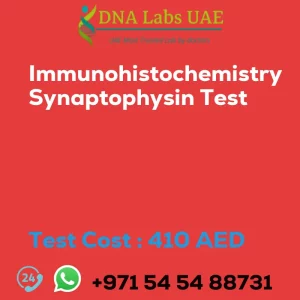IMMUNOHISTOCHEMISTRY ACTIN SMOOTH MUSCLE ACTIN Test
Test Name: IMMUNOHISTOCHEMISTRY ACTIN SMOOTH MUSCLE ACTIN Test
Components: Smooth Muscle Actin (SMA) Test
Price: 410.0 AED
Sample Condition: Submit tumor tissue in 10% Formal-saline OR Formalin fixed paraffin embedded block. Ship at room temperature. Provide a copy of the Histopathology report, Site of biopsy and Clinical history.
Report Delivery: Sample Daily by 6 pm; Report Block: 5 days, Tissue Biopsy: 5 days, Tissue large complex: 7 days
Method: Immunohistochemistry
Test Type: Cancer
Doctor: Oncologist, Pathologist
Test Department: DNA Labs UAE
Pre Test Information: Provide a copy of the Histopathology report, Site of biopsy and Clinical history.
Test Details
Immunohistochemistry (IHC) is a technique used to detect specific proteins in tissue samples. The smooth muscle actin (SMA) test is an IHC test that specifically targets smooth muscle actin proteins. Smooth muscle actin is a protein found in smooth muscle cells, which are responsible for the contraction and relaxation of various organs and blood vessels in the body. The SMA test helps identify and locate smooth muscle cells in tissue samples.
The process of performing an immunohistochemistry SMA test involves the following steps:
- Tissue Sample Preparation: A tissue sample, typically obtained from a biopsy or surgical resection, is fixed in formalin and embedded in paraffin wax. The sample is then sliced into thin sections.
- Deparaffinization and Rehydration: The paraffin wax is removed from the tissue sections using xylene or other clearing agents. The tissue is then rehydrated using a series of alcohol washes.
- Antigen Retrieval: The tissue sections are subjected to antigen retrieval, which involves heating the sample to unmask the target antigens. This step helps improve the accessibility of the SMA protein for antibody binding.
- Blocking: Non-specific binding sites on the tissue sections are blocked using a protein-blocking agent, such as bovine serum albumin or normal serum.
- Primary Antibody Incubation: The tissue sections are incubated with a primary antibody specific to smooth muscle actin. The primary antibody binds to the SMA protein if present in the tissue sample.
- Secondary Antibody Incubation: After washing off unbound primary antibody, the tissue sections are incubated with a secondary antibody conjugated with a detection system. The secondary antibody binds to the primary antibody, amplifying the signal.
- Visualization: The detection system used can vary, but common methods include enzyme-based systems (e.g., horseradish peroxidase) or fluorescence-based systems. These systems generate a visible or fluorescent signal at the location of the smooth muscle actin protein.
- Counterstaining and Mounting: To enhance tissue visualization, the tissue sections may be counterstained with dyes such as hematoxylin or eosin. Finally, the sections are mounted on glass slides for examination under a microscope.
The results of the immunohistochemistry SMA test are typically interpreted by a pathologist. The presence and distribution of smooth muscle actin staining in the tissue sample can provide valuable information about the presence of smooth muscle cells and their involvement in various diseases or conditions.
| Test Name | IMMUNOHISTOCHEMISTRY ACTIN SMOOTH MUSCLE ACTIN Test |
|---|---|
| Components | |
| Price | 410.0 AED |
| Sample Condition | Submit tumor tissue in 10% Formal-saline OR Formalin fixed paraffin embedded block. Ship at room temperature. Provide a copy of the Histopathology report, Site of biopsy and Clinical history. |
| Report Delivery | Sample Daily by 6 pm; Report Block : 5 days Tissue Biopsy : 5 days Tissue large complex : 7 days |
| Method | Immunohistochemistry |
| Test type | Cancer |
| Doctor | Oncologist, Pathologist |
| Test Department: | |
| Pre Test Information | Provide a copy of the Histopathology report, Site of biopsy and Clinical history. |
| Test Details |
Immunohistochemistry (IHC) is a technique used to detect specific proteins in tissue samples. The smooth muscle actin (SMA) test is an IHC test that specifically targets smooth muscle actin proteins. Smooth muscle actin is a protein found in smooth muscle cells, which are responsible for the contraction and relaxation of various organs and blood vessels in the body. The SMA test helps identify and locate smooth muscle cells in tissue samples. The process of performing an immunohistochemistry SMA test involves the following steps: 1. Tissue Sample Preparation: A tissue sample, typically obtained from a biopsy or surgical resection, is fixed in formalin and embedded in paraffin wax. The sample is then sliced into thin sections. 2. Deparaffinization and Rehydration: The paraffin wax is removed from the tissue sections using xylene or other clearing agents. The tissue is then rehydrated using a series of alcohol washes. 3. Antigen Retrieval: The tissue sections are subjected to antigen retrieval, which involves heating the sample to unmask the target antigens. This step helps improve the accessibility of the SMA protein for antibody binding. 4. Blocking: Non-specific binding sites on the tissue sections are blocked using a protein-blocking agent, such as bovine serum albumin or normal serum. 5. Primary Antibody Incubation: The tissue sections are incubated with a primary antibody specific to smooth muscle actin. The primary antibody binds to the SMA protein if present in the tissue sample. 6. Secondary Antibody Incubation: After washing off unbound primary antibody, the tissue sections are incubated with a secondary antibody conjugated with a detection system. The secondary antibody binds to the primary antibody, amplifying the signal. 7. Visualization: The detection system used can vary, but common methods include enzyme-based systems (e.g., horseradish peroxidase) or fluorescence-based systems. These systems generate a visible or fluorescent signal at the location of the smooth muscle actin protein. 8. Counterstaining and Mounting: To enhance tissue visualization, the tissue sections may be counterstained with dyes such as hematoxylin or eosin. Finally, the sections are mounted on glass slides for examination under a microscope. The results of the immunohistochemistry SMA test are typically interpreted by a pathologist. The presence and distribution of smooth muscle actin staining in the tissue sample can provide valuable information about the presence of smooth muscle cells and their involvement in various diseases or conditions. |








